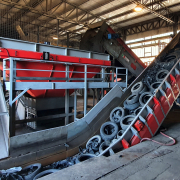Recycling Sector Urges Action from EU Member States as Economic Pressures Mount under Waste Shipment Proposals
Despite some notably positive adjustments to the European Commission’s Waste Shipment proposal, this far-reaching legislation continues to pose fundamental threats to European recyclers and Europe’s burgeoning circular economy. Regrettably, EU lawmakers continue to push forward legislation that will incentivise the extraction of primary raw materials by adding more regulatory burdens on recyclers.
“There is already an oversupply of more than 20 million tons of recycled metals and 7 million tons of recovered paper in the EU. If access to international markets is cut off, demand will collapse and the economic viability of recycling these materials will drastically decrease. Recyclable materials would instead be dumped in landfills, and collection and recycling volumes would significantly decline as well. In the end, taxpayers and municipalities would have to pay the bill,” states Olivier François, President of the European Recycling Industries’ Confederation (EuRIC). “This conflicts fundamentally with the EU’s own circular economy and Green Deal ambitions. Member States must now act by putting a halt to the proposal’s most erroneous measures or risk European job losses and recycling facilities – especially SMEs – shutting their doors permanently,” he added. Furthermore, European recyclers call for an audit register that is built on well-established business practices that guarantees market transparency and access to audits for SMEs.
The EU Single Market for recycled materials is still hampered by disproportionate “notification” procedures. Europe boasts some of the most innovative and advanced recycling facilities globally, yet highly specialised facilities for certain materials, particularly plastics, are not available in all 27 Member States. Regrettably, EU internal trade is held back by uncertain rules that allow Member States to reject shipments of materials destined for recycling, often on unjustified grounds. EU Member States must now ensure that recyclers are provided with legal and administrative certainty which will facilitate shipments of materials for recycling and truly boost a homegrown European circular economy. For example, the inclusion of EU3011 and EU48 entries for non-hazardous plastic waste will be critical for ensuring proper plastic recycling.
Source: EuRIC (Brussels, March 07, 2023)







